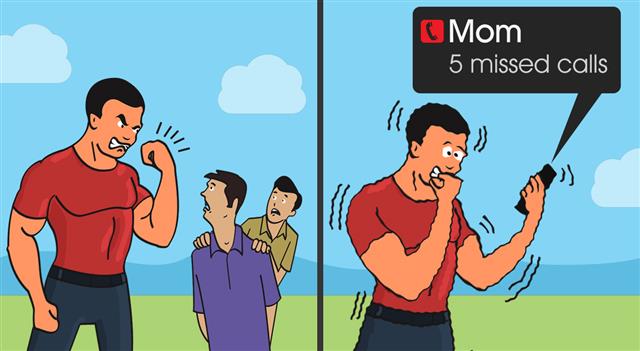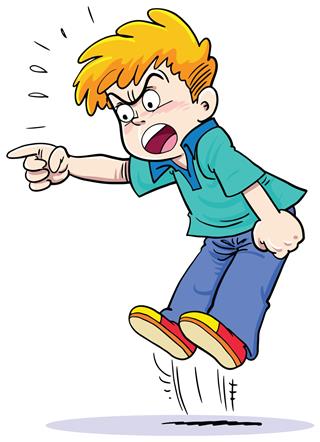
Children are affectionate and adorable. It is the role of an adult to guide their development in the physical, emotional, and moral sense. Despite this, there may be a few children who may go off the path and show signs of bullying others, and it is the adult’s responsibility to deal with their bullying child, and stop him/her from going further.
What Happens when Bullying is not Nipped in the Bud?
This is the dreaded nightmare that every parent carries, but hopes will never come true. It is a sign that everything is not well in that hunky-dory world that you have created for you and your family. A phone call from Hell would be better, you think. Or you notice your child pushing around other kids at the playground and wonder, “who taught him/her to do that?”
To see that your child has turned into a bully is the worst possible shame-inducing comment for a parent. Or so one may think. Bullying behavior in children is learned, and can be identified, addressed, and unlearned. It is not the be-all and end-all pattern of sequences. When curbed in the initial stages, a child has more chances for improvement, and it is quite possible to turn their lives around at this early stage. Though a daunting and difficult task, a parent can learn to handle the pressures of dealing with a bullying child who has been at it for years, too. You must have courage, take heart, stand your ground, and make sure to follow up and take active participation in the development of your child’s experiences of the world. Your goal should be to eliminate the bullying behavior from your child’s psyche, in a kind, thoughtful, but strict way. Tantrums will occur, and you will initially encounter much hesitation and smart talk from the child, but your persistence, along with help from essential others, will pay off.
Control your Reactions
When you first hear the news or realize that your child may possibly be a bully, contain your reactions and do not retaliate at your child, spouse, or the third person delivering the news. Do not be indifferent either. Your reaction sets the stage for future actions and interactions. Aim for gathering as many facts as possible, from both parties. If you find yourself losing your cool, take a time-out to sort your thoughts and try to attain an objective, receptive, and impartial view.
Why does Bullying happen?
To cope, you need to understand how the bullying has come about, and what could be the reason for your child to start bullying. (S)he may have a tendency towards pushy behavior. May be your child has picked up this behavior from home, through peers, or bad company. May be he was once bullied, and so has resorted to bullying. Know that anyone, including your own child, can become a bully, irrespective of appearance and gender.
Understand Your Responsibility
Do not rule out the possibility that your child may have learned such behavior through your example with the spouse, household help, friends or colleagues. Introspect to realize whether it is you, or not, but do not shirk the responsibility if it is not your fault either. It is a parent’s duty to raise a responsible and sensible child. Whatever the reasons, it is up to you to rectify the issue, and no one else will do it as well as you can.
Reach out to the Victim and Family
If and when you do receive the dreaded call from the livid parents of the child your little one has hurt, never lose your cool or blame the parents or their child. Do not try to divert the blame from your child. Instead, listen with an open mind, gather all the facts from their perspective, and try to calm them down. Reassure them that you will look into this, and follow through with your promise. Avoid making it personal between the parents at all costs.
A Bully does not a Bad Parent Have
Understand that you’re still a good parent, but need to work harder on raising the child as a responsible adult in the little time you have. You cannot be there to instruct and supervise 24×7. Children are bombarded with information since birth, and how they behave when you’re not around depends on how well you’ve taught them. So learn to start spending quality time with your kid so that he or she can segregate and imbibe real-world experiences accordingly.
Talk to the child
Explain what constitutes bullying, including the verbal, physical, mental, cyber, and sexual kinds. Ask him/her whether he/she has ever been subjected to bullying behavior in the past due to which he is acting out. Talk of anger management. Make sure you know the facts from both sides as well as an impartial third party, and question your child gently as to why he did what he did. There are deeper motivations than one might think.
Know Your Little One
We all think we know our children, because well, they’re ours! This isn’t always true. They may not be the same at school or when playing with friends. What is worse is that you have no way of knowing. You have to trust that they make the right decisions when you’re not around. If you know your kid is the naughty kind, take a stricter stance. If he’s a quiet one, you’ll want to know what’s going on inside that head, instead of shouting at him. Take steps that suit the child.
Identify any External Source of Influence
Only after thoroughly establishing that there is no bad influence on your child within the household, should you explore whether the source is away from your eye. If this is the case, question your child kindly, take note of the company your child keeps at school, and monitor or limit the number of hours your child takes up on the computer. Try to explain things that are not acceptable, like speaking bad words to others and reiterate manners. Go over all basic etiquette.
Work with Other Authority Figures
Call your child’s teachers, school counselor, and the bullied child’s parents, if feasible, and talk to them. Ask them advice and feedback on how to improve the situation. Make sure you work with them, rather than contradict them on their views by defending your child. Angry backlash from adults will make your child unreceptive and worse; a method of enforced discipline is not known to have any great benefits.
Clarify your Expectations
Make expectations, distinctions between good and bad actions, and consequences clear. Teach empathy and responsibility, even if your child was provoked, and ask them what the other person felt. Make it known that there will be consequences for bad actions, but give a fair chance to explain. However, do not threaten or punish the child. They must know what you dislike in their behavior, but without judgment. Once a habit develops, it will automatically take hold over time.
Counseling
Counseling is essential in addition to the other steps you must take to deal with a child who bullies. The child might open up and tell the counselor things he or she cannot or does not want to tell you. It will probably be the best way to stop the behavior once and for all, through therapy. He or she may not agree at first, but taking him to see a counselor is your best bet. Work in tandem with the counselor to reinforce what every session teaches.
Role Play
If your child has difficulty understanding the other point of view, the best solution is to role-play. Pretend that you’re the bully and they’re the victim, and ask them how they feel being treated this way. Sooner or later, repeated role play will make them understand how the other party feels, and will teach the child how to literally put himself in the other person’s shoes.
Address the Situation
Make changes at home if home is the source. Provide a safe environment for healthy discussion instead of put-downs. Both parents should be supportive and take the same stance. Do not blame each other, especially not in front of the child. Do not taunt the child in front of relatives or friends. Change your own behavior and work by example, if it is one of the family that the child has learned to imitate. Treat your help, relatives, and friends well, and your child will too.
Encourage the Child to Approach You
By your overreacting or reacting inappropriately, it becomes difficult for a young person to approach you as a confidant without the fear of being judged. There will be friction if this is the case, and your behavior determines whether your child will approach you in future.
Keep Your Spirits Up
Continue with your routines, and try not to be bogged down by thoughts about the future of your child. Don’t get ahead of yourself because it will reflect in your attitude towards the child. Children will spot a negative attitude a mile off, and it will rub off on them and make things worse. They should look to you for support, and not the other way round.
Reiterating to your son or daughter that you love them no matter what, is the most important aspect. Children need love, reassurance, and support in order to make healthy changes for the better. Know your little one, and make step-by-step changes accordingly. It’s never too late!
















